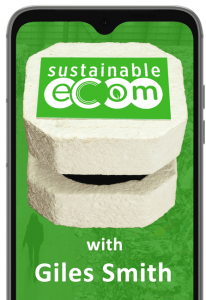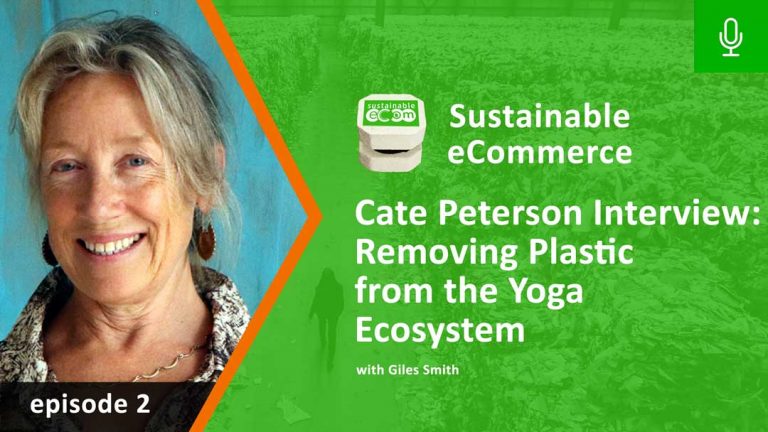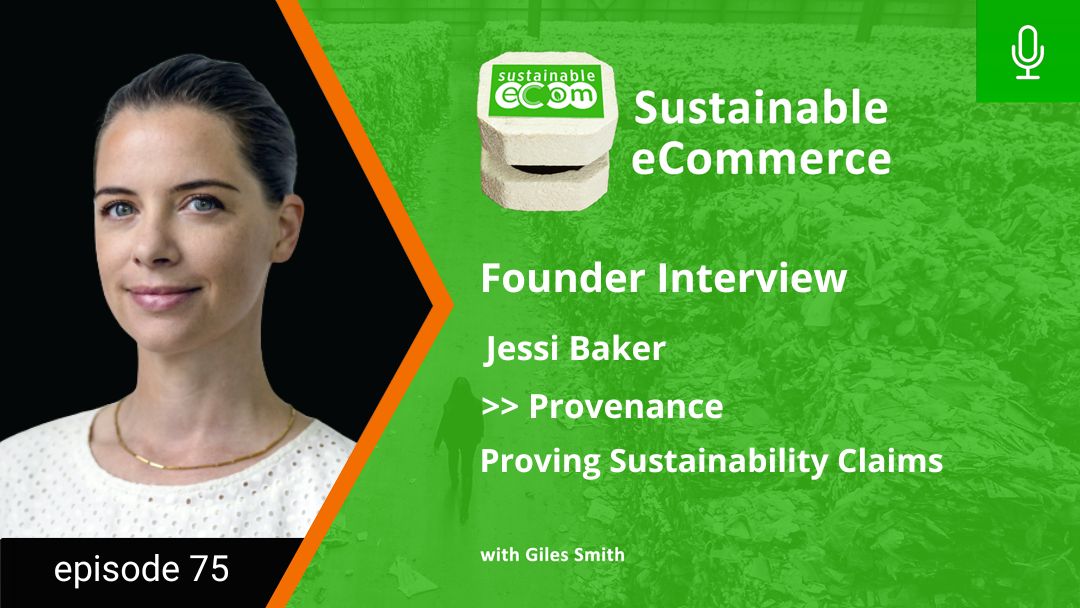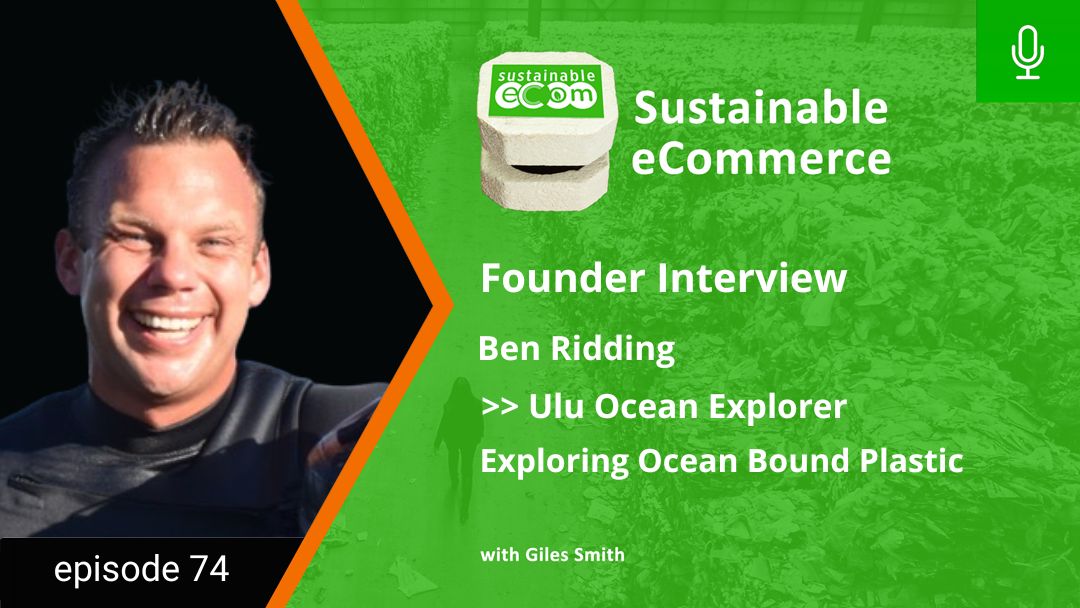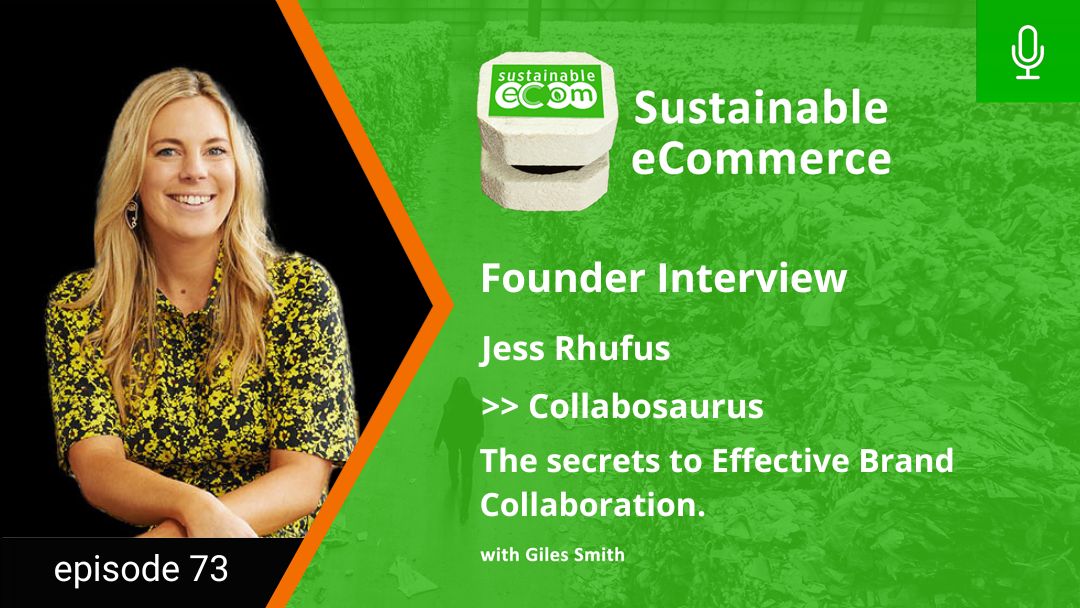Welcome to episode two of the Sustainable eCommerce podcast! The show dedicated to growing e-commerce brands sustainably. Today, I'm joined by Cate Peterson, founder of LovEarth.
Cate has a deep and influential history in the yoga industry here in Australia. She's on a mission to remove plastics from the yoga ecosystem.
Her brand LovEarth has now completely transitioned to making compostable yoga mats. So, if you have an existing brand perhaps using non-sustainable Materials, I hope you'll be quite inspired by Cate's journey.
Giles Smith: Cate Peterson, welcome to the show!
Cate Peterson: Thank you so much, Giles. I love to be noisy about what we're doing!
Giles Smith: And you should be, because I think you've accomplished some incredible things. When I came across your brand probably a couple of months ago now, I just knew that you were someone that I really want to connect with and I knew you had a great story to share with everybody in the e-commerce space. I love the fact that you're rethinking how yoga mats are produced. Maybe give a bit of background about yourself. Who is Cate Peterson? How did you come to doing LovEarth? And, tell us a little bit about where love earth is today.
Cate Peterson: Thank you very much. We started 10 years ago and at that stage, there was not a lot of eco mats out there in the market at all. There was something called ecomat from England, and they were made from {plant} rubber, that was good. But that was about where it stopped, basically.
So, at that point I'd been running a business called Yoga Solutions. We started doing the very first corporate yoga in Australia at the time when everybody thought we were crazy. But for those of you that know the yoga world, it's in every single business now, it's just part and parcel really of what what's provided for employees.
So, we started then and we were buying PVC mats, I dread to think! We were getting pink ones for those with pink logos, brown ones for those with brown logos, and so on.
And one day I thought, I wonder how this mat is made, you know, cause I really hadn't thought about that at all. And, I don't think that many people in the yoga world had started thinking about where they’re coming from. So, when I started to do the research, I was horrified. Oh, my Lord! We'd been out there for the last eight years selling these mats that are actually carcinogenic for the people using them, and carcinogenic for the planet. I just said, I kind of hate doing that. And I thought, let’s come up with a better solution.
So that's how LoveEarth was born really, out of guilt!
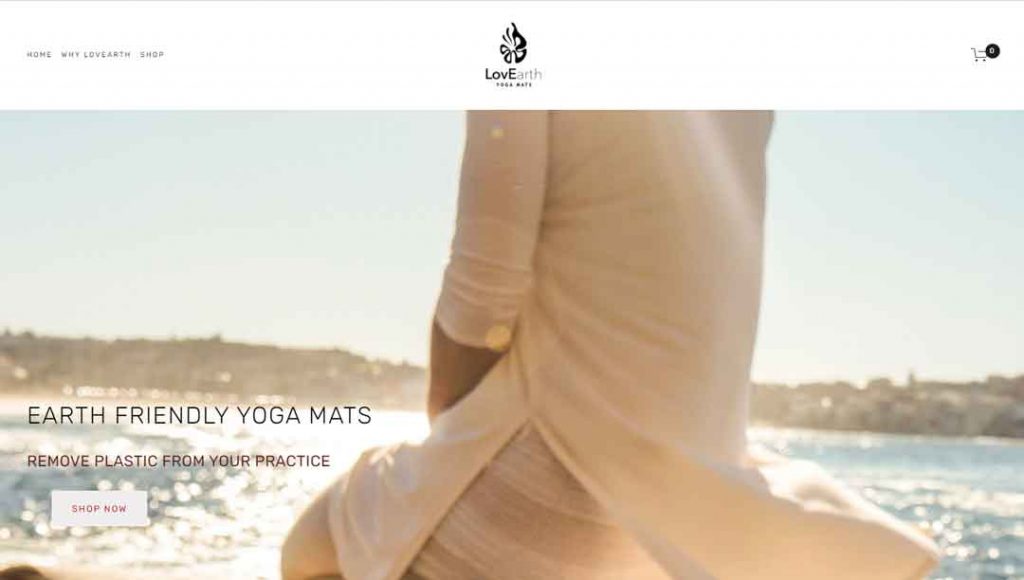
Giles Smith: Well, I suppose that's as good as reason there's any! What I love is the fact that you've actually then taken the big steps and put the big things in place, because I think that’s where so many people stop. They say “it doesn't feel right, but I don't know how to change it”.
I think that's really one of the big hurdles, particularly for people that already have a brand and have something going, is that it all seems so hard to reinvent it all. So how did you actually put all that together? How did you go and find the materials and suppliers?
Cate Peterson: Well, first of all, we ordered all the eco mats out there already and brought them in and realized that they didn't fit the bill. Some of them were really pillable and some were stringing at the sides. Basically, we were finding that the durability and quality wasn't very good. So, we actually started the process of designing them along with the company that we used in Taiwan previously. It was their first sustainable mat. And that was quite a big job for them to come up with that.
We had a lot of wrong turns and a lot of bad ideas and, we've been managing it all remotely, which is not ideal. Actually, I would've liked to be over in Taiwan, holding their hand, going through things. We did have due diligence by getting them to send manufacturing reports, which basically looked at all the ingredients and the toxicity levels and they were proper really well done reports.
We went backwards and forwards until we came to something that was really, really grippy and beautiful, and very pure. Then, the first lot of mats that they sent to us, the whole batch was wrapped in cling film! So we had a talk with them about how we could package them better.
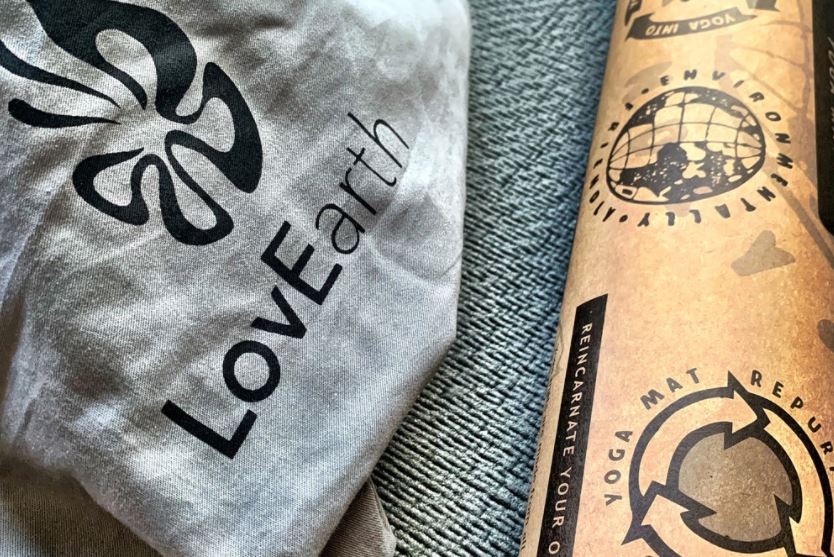
Giles Smith: You talked there about the process of having gone through lots of different iterations to find something was just the right, durability and softness and I guess roll ability and all those other things that you were looking for. And you've ended up, I think with plant resin and jute. Can you tell us a little bit about Jute and what it can be used for?
Cate Peterson: Yeah, Jute comes from Bangladesh. It's a very sustainable industry and it's actually a beautiful, long grass. They export it over to Taiwan and then it's used there.
Um, it's also used to make rope and the whole lot of other things it's very, durable. We could have used hemp, but hemp is a lot more expensive because it was flavour of the month! So we decided to use Jute, and the rubber comes from anywhere from all the way in north Thailand, all the way down to the south of Malaysia. It varies in color, depending where it comes from.
There's no such thing as fair trade rubber. But there is however, something called fair rubber, which comes from a farm that's deemed to be looking after its workers and to be working towards sustainable development. We don’t have those relationships (with fair rubber farms yet). Ideally what would be perfect is to develop fair rubber products here in Australia.
There's also a lot of beautiful grasses in Australia that could be used just as well as Jute. So, ultimately it would all be made here. We did look at making it here, but we found that it was an incredibly expensive process. We talked to quite a few different factories. We found out that the cost price was greater than what we were retailing for! So, we haven't managed to find the pathway through yet, but we continue to do.
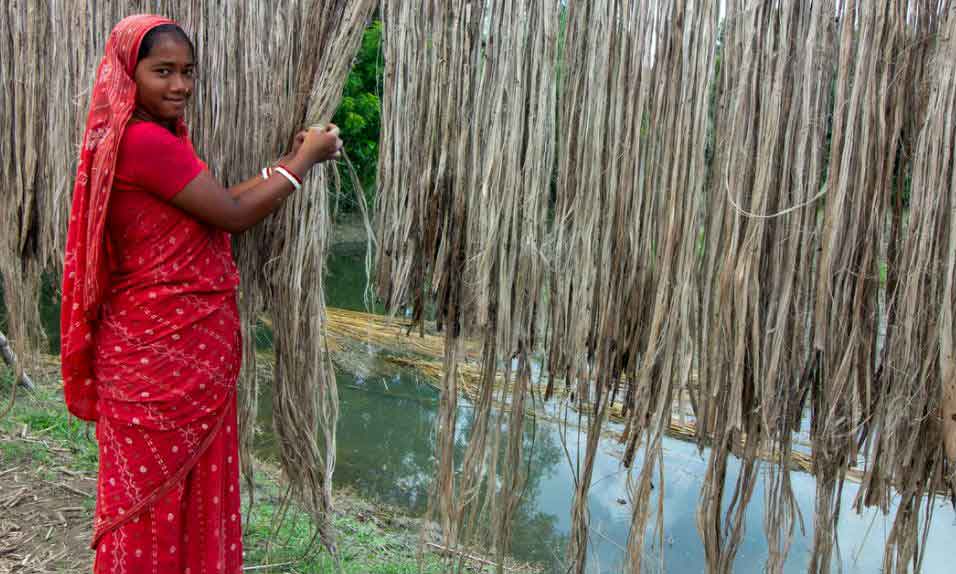
Drying Jute Fibres in Bangladesh
Giles Smith: I think you've hit on a really central conundrum for everybody, particularly in the sustainable space. Traditional brands have kind of worked this out many years ago, hence manufacturing is all gone to places like China and Taiwan and so on, but, from a sustainability point of view, it's a journey. We obviously want to minimize the transportation cost in carbon footprint, along the supply chain, and yet clearly manufacturing here in Australia just makes things so incredibly expensive by the time it gets to the consumer that it becomes unviable. So, you’ve offshored a lot of this. You're in Taiwan and you've got the sustainable raw materials coming from other locations. How do you go about managing the quality of what those people are producing for you, particularly with regards to the materials they're using?
Cate Peterson: We always make sure that we get a report. There's some really good chemical reports that can be paid for and achieved. So we make sure that we have an international standard checking on that. You just have to, because otherwise you don't know what goes in there. I'm also really clear that we're making these in Taiwan because it's not China. At one point we thought we might try and find a cheaper way to make the mats because our profit margin isn't monster. We ended up with people sending us things, claiming that it was actually natural rubber. But the word natural rubber is really interesting because you can legally use natural rubber to describe petrochemical based rubber as opposed to tree rubber. So we got quite a few of those samples coming back and we just pulled it. We also weren’t sure about how the workplace would have been for people. Whereas in Taiwan, it's an eight hour day and there's really strict rules, there's a lot of really good operators
Giles Smith: Much more ethical type of management of the staff. So, you've got the raw materials together. You found your factory over in Taiwan and obviously you're still there now, which must mean you've got a long standing and great relationship with them. Then you're importing them over, but you didn't stop there. You've top and tailed the whole process by offering to take in people's old reuse mats and recycle them. How did you come to that decision? How do you manage that in your supply chain?
Cate Peterson: Yeah. So let me say that we never set off to make mega bucks. It would be nice and will be nice when it happens. But, the main purpose was to try and get plastics out of the yoga ecosystem.
There’s a lot of people still buying PVC and TPE and other mats that are filthy. That's a very strong word, isn't it? So we were trying to stage a way of encouraging people, not to do that anymore. And as spoken about 62% of yoga teachers or below have a wage that's below the poverty line. There’s not a lot of money floating around, so it's very tempting to make cheap, nasty choices. So we decided that we would try and give them a way that they could move in that space.
So instead of people and also studios taking their old mats and throwing them into landfill where they will never rot, we accept them back and we store them at the moment in my long-suffering parents' garage! And then, we ship them out to places that need them, like dog shelters, the Wesley mission and different places that support people on the streets because yoga mats are a great sleeping platform. We also provided them for anybody that was doing yoga for good in prison. So it's an active love, really.
Giles Smith: I love the thoughtfulness with which you’re looking at the whole ecosystem that the whole loop. Looking at the other end you've marketed these as compostable yoga mats. I think there's a lot of question marks and confusion around what compostable really means. What's your view on that?
Cate Peterson: Compostable, because that's what we do with them in my backyard! We chop them up and we put them into the compost or else we'd lay them on top of the soil to stop the weeds. And they're pure. So they are made out of pure substances, which means that I'm totally happy with them going into my vegetables. And so should other people be.
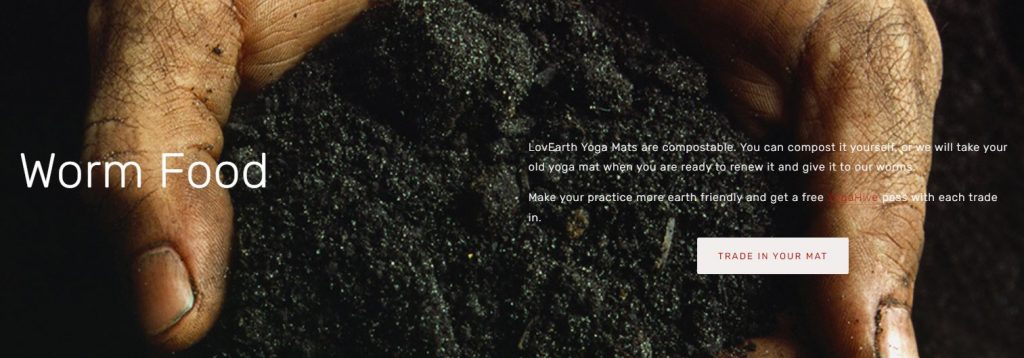
Giles Smith: Do you find you’re fielding questions around compostability? Like, “Oh, if it's compostable, how long would it last?”
Cate Peterson: Rubber does break down, but we've had studios that have had them, the whole eight years have continued to use them. They don't look the most beautiful by eight years! We’ve now got a charcoal mat. As far as I know, every other black yoga mat is using something called carbon black to make that black. That’s the most disgusting product ever. It's a petrochemical byproduct of the coal coaking process. The people that work in that industry get terrible disorders and diseases. It's petrochemical, and it's not a good thing to have in the mat. So we instead use binchotan charcoal, which is beautiful and comes from Oak trees in Japan and also in Taiwan. It's used as a purification for a water, but it's also used to color our mats!
Giles Smith: But it's pure. I love that once again, you know, I just applaud you. For considering all of the details of this in terms of its sustainability, where it comes from.
And of course, one of the things that's standing out to me and talking to and reading your bio as well is just how busy you are! How do you balance your time? As an entrepreneur, we all get so busy trying to do a million things and get excited and passionate about what we're doing. How do you make it all happen?
Cate Peterson: It’s called the dog! Simple technique. You've got to walk the dog, which is, you know, a synonym for life.
I think the most important thing for me is just that I have to listen up and it's got to move slow and sustainable to me. Like if you're a rush, rush, rush, no matter what you're going to get there, you're going to break things.
That's not my way of doing business. I don't really care so much about the profit margin as long as I can eat, but I do care about the impact that I'm having, I really, really do. And, you know, I'm surrounded by equally enthusiastic people. You know, you need a community of people that like yourself, that you can actually call up, have a cup of tea with, get excited with et cetera.
You know, that horrible statistic that 64% of people across the globe are in jobs from which they find no sense of purpose. I can't imagine what that would be. I think that's staining {having a community around you}.
Giles Smith: I think organizations like yourself, and anyone that's following things like the B-Corp line in becoming purpose-driven brands, it makes sense. The notion of the great resignation, it's harder than ever to find people who will not just turn up and do a job, but actually be part of it and bring their brains and their hearts into the place as well. That’s what makes the difference between a great company that's growing and multiplying its people to one that’s just a bunch of cogs in a machine.
One thing I I'd love to know on that journey that you've had. What's been your biggest challenge? How did you overcome it?
Cate Peterson: The biggest challenge has been the whole thing of doing as well as promoting. It’s such a continual juggle, isn't it? I haven't been particularly good at that. I've just had to forgive myself. And I guess that has been the hardest part because in this world we are judged by how much money we have. And it's been really hard for me to just go, you know, I could go out and get a mega job. Sure. I'm qualified enough to do so. And I've had enough experience to do so, but I choose to move in this more sustainable way and to feel happy.
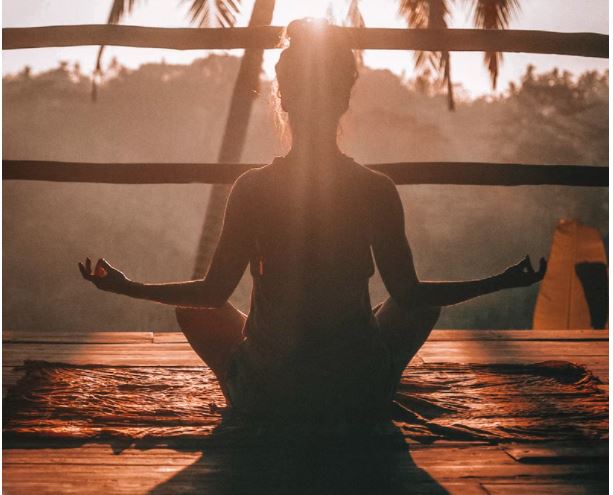
Giles Smith: I love that. I just want to ask you one more question, which is, if you were to cast your mind back a couple of years to when you were in your twenties and if you were starting out your sustainable e-commerce business now, what would you say to yourself?
Cate Peterson: Wow, what would I say? I would say this is going to be a long and pleasurable journey as complex as any worthwhile journey might be. And that you’ll reap many, many rewards along the way, and you'll have stumbling blocks and you'll have, rivers to ford and mountains to climb. But by the end of it, you'll be wiser and the world will be a better place from your endeavors.
Giles Smith: I love that because ultimately, any business journey is all about persistence.
So where can people get hold of your beautiful yoga mats?
Cate Peterson: You can go to https://lovearth.com.au. Love to see you there and we're always up for a chat!





